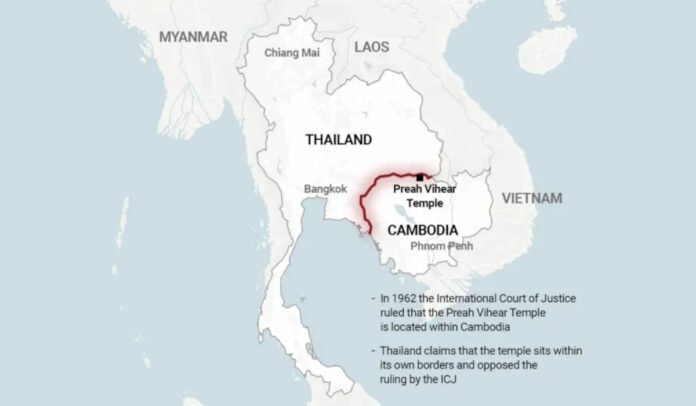Tensions between Thailand and Cambodia have flared up once again, as cross-border clashes between their armed forces entered a third consecutive day, leading to widespread concern across Southeast Asia. The ongoing skirmishes have already resulted in evacuations from several border villages and mounting diplomatic pressure from regional powers to prevent further escalation.
According to reports from local officials and media in both countries, the latest round of violence erupted following a disputed military patrol along the undemarcated portions of the border in the northern Cambodian province of Oddar Meanchey and adjacent Thai territories. Heavy exchanges of small arms and artillery fire have been reported, with injuries on both sides, although neither government has officially confirmed casualty figures.
The conflict zones, marked by dense forests and poor infrastructure, have long been contested due to overlapping historical claims, particularly around ancient temples and land access routes. Tensions had remained relatively subdued in recent years, but this latest outbreak of violence threatens to undo years of diplomatic progress under the ASEAN peace framework.
In response to the growing crisis, Malaysia’s Foreign Ministry issued a statement on Friday urging both nations to “exercise maximum restraint and return to the negotiating table.” The statement went on to call for an emergency ASEAN meeting to help mediate the dispute and safeguard regional stability.
Thailand’s Defence Ministry blamed Cambodian forces for what it called a “deliberate provocation,” claiming their troops were fired upon while patrolling Thai territory. Cambodian officials, however, denied the allegation and accused Thai soldiers of crossing into Cambodian soil. Both sides have reinforced their border deployments.
The clashes have triggered panic among civilians living near the contested zones. Dozens of families from Cambodian villages have reportedly fled deeper inland, while Thai authorities have begun relocating schoolchildren and the elderly from at-risk areas. Temporary relief shelters have been set up on both sides of the border.
ASEAN observers have expressed concern that the military standoff, if prolonged, could destabilize broader regional cooperation, especially at a time when member nations are grappling with economic recovery challenges and geopolitical shifts in the Indo-Pacific.
Although previous incidents have been resolved through diplomacy, including ASEAN-brokered ceasefires and joint border demarcation talks, analysts fear that heightened nationalism, military posturing, and weak internal political consensus in both countries could complicate de-escalation efforts.
With no ceasefire agreed yet, and field commanders reportedly lacking direct communication channels, the international community is watching closely. The United Nations and key players such as Indonesia and Vietnam are also expected to issue formal responses if the violence continues over the weekend.

























